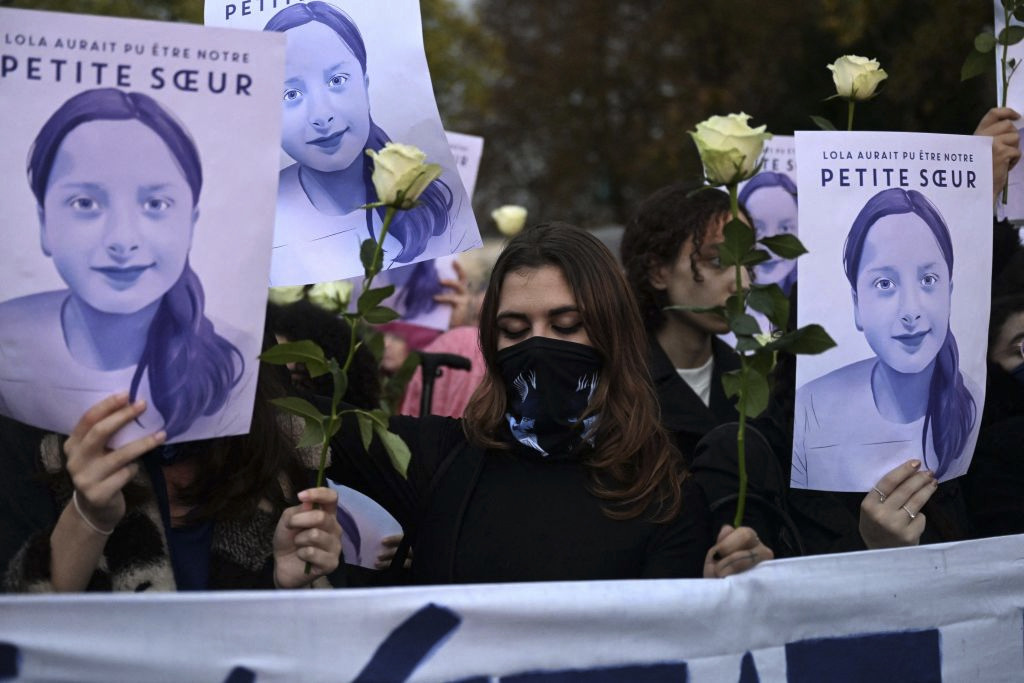October 15. The corpse of a 12-year-old girl hidden in a big plastic box is discovered on a sidewalk in the eastern part of Paris. The victim’s name was Lola. She was the daughter of the caretakers of the building where the murder took place.
Witnesses, fingerprints and images from surveillance cameras quickly lead police to arrest a woman. She confessed but said she had absolutely no remorse. The details she gave, confirmed by the autopsy, are that she gagged Lola with tape, undressed her, tied her to a chair, raped her with objects, partially cut her throat, put the blood in a bottle and drank it, smoked a cigarette, then finished slitting Lola’s throat and beheaded her. The woman stabbed the corpse multiple times before placing it in a plastic box, and took it down to the street.
The woman, a 24-year-old Algerian named Dahbia B., came to France on a student visa but did not leave after it expired in 2018. She had already been arrested by the police this August, ordered to leave France — and then released. She should not have been in France in the first place. Had she been deported, and if the French police and department of justice had done their job, Lola would still be with us.
”The suspect in this barbaric act should not have been on our territory,” saidMarine Le Pen, leader of the National Rally Party. ”Too many crimes and offenses are committed by illegal immigrants whom we have not been willing or able to send back home.”
”When will we defend our children against attacks committed by the same people, always at the expense of the same people,” asked former journalist Éric Zemmour, president of the Reconquest Party.
”This criminal immigration laxity revolts me,” said Eric Ciotti, one of the leaders of the Republicans Party.
Instead of acknowledging flaws in police procedures and promising to improve security, the French government offered Lola’s parents condolences.
President Emmanuel Macron waited two days to receive the victim’s parentsbriefly. He did not say a word in public. No political decisions regarding illegal immigration and its links to increased crime in France were announced, no political decisions will be taken.
Prime Minister Elisabeth Borne told the political leaders that they had shown no respect for the pain of the victim’s family. She accused them of ”indecency” and asked them to be quiet.
”Using a 12-year-old kid’s coffin like a stepping stool to indulge in diatribes is shameful,” Justice Minister Eric Dupond-Moretti added.
A lawyer, Gilles-William Goldnadel, suggested that the government preferred silence so that no one would talk about how extremely lax its immigration policy is, as well as the consequences. It was indispensable to face the situation urgently without looking away, he said.
The borders between France and other European countries are open and, like all the borders of Europe, porous. Hundreds of thousands of immigrants enter Europe illegally each year. Many head for France and stay there. They have been benefiting, since 2000, from financial aid and free medical care to which even poor French citizens do not have access. If they are arrested, like Lola’s murderer, they are ordered to leave the country, but are not placed in a detention center so the order, never enforced, is not an order at all. In 2020, 107,500 orders to leave France were issued; fewer than 7% took place.
Illegal immigrants in France are the perpetrators of nearly half of crimes committed in the country, according to the recently published L’ordre nécessaire(”The Necessary Order”), by Didier Lallement, former chief of the Paris Police. Approximately 48% of all crimes committed in Paris in 2021, he notes, were committed by illegal immigrants. Murders almost as gruesome as Lola’s — most of which are committed by illegal immigrants — are committed nearly every day. No one even mentions them. The victims often have their throats slit. When the mainstream media report on the murders, they do not talk about slit throats. They say the victim was ”stabbed in the neck.”
The French now live in a climate of generalized violence. Maurice Berger, a psychiatrist, speaks of ”gratuitous violence”: violence for no other reason than the pleasure of committing it. He reports that in France, gratuitous violence resulting in injury or death happens, on average, every two minutes. France reports more than two hundred rapes a day. Berger, in Sur la violence gratuite en France (”On Gratuitous Violence in France”), notes that usually the assaults have a racist dimension: the victims are always white people, the aggressors are almost always Arabs or Africans — details omitted by the commentators. Polls show that the French population are seeing violence rising sharply: 68% of French people say they feel their lives are increasingly insecure, and 75% say that the record of Macron and the government fighting crime is poor. 70% believe that illegal immigration is a serious problem. Nevertheless, in May 2022, a majority of voters re-elected Macron and rejected candidates who promised to fight crime and illegal immigration.
In an apparent attempt to explain this odd outcome, many commentators say that the French population now expects the downfall of their country. They quote surveys, carried out year after year, which show that the French population is the world’s most pessimistic. An overwhelming majority of French people evidently think the future will be worse than the present. A poll published in April 2022 states that 77% of French people are certain that the country will not overcome the present economic and social crisis; a poll published in September 2022 show that 67% of French people think that the global situation will worsen due to climate change and that the planet has no future. In L’archipel français (”The French Archipelago”), published in 2019, sociologist Jérome Fourquet writes of a French ”collective nervous breakdown” and the ”crumbling” of French society. He notes that the religious and historical moorings of the French people are disappearing: churches are empty, important moments in the country’s history are no longer taught in schools. He adds that France’s Muslim population, on the contrary, maintains its culture, customs and traditions, assimilates into French society less and less, and appears more and more filled with contempt and hatred for France, which many of them accuse of colonizing the Muslim world and exploiting Muslim workers.
Speaking about a ”great replacement” of the population in France is taboo. Anyone who does it is immediately demonized and described as a follower of conspiracy theories. But the numbers are clear. Former Secretary of State for Foreign Trade Pierre Lellouche recently said that ”40% of children aged 0 to 4 are immigrants or of immigrant origin as of the last census”. In addition to hundreds of thousands of illegal immigrants already in France, approximately 400,000 more immigrants from Africa and the Arab world enter France each year. At the same time, hundreds of thousands of French people emigrate from France annually. In 2018, the most recent year for which figures are available, 270,000 French people left. Over the past 20 years, the number of French people living abroad has increased by 52%.
Speaking about the 750 no-go zones (”zones urbaines sensibles”) growing on the outskirts of all France’s big cities, and ruled by Islamic gangs and radical imams, is also taboo. Many books describe the seriousness of the situation. In his book Les territoires conquis de l’islamisme (”The Conquered Territories of Islamism”), published in 2020, the sociologist Bernard Rougier wrote:
”Islamist networks managed to establish enclaves in the heart of working-class neighborhoods…. ideological and institutional centers located in the Arab Middle East and the Maghreb can successfully disseminate their concept of Islam there”.
The meticulous data in the book did not elicit any response from the French government. Whenever someone is arrested, injured or killed by the police in or near a no-go zone, riots break out. When an arrest turns violent, the police are asked to let criminals seeking refuge in a no-go zone escape. The government evidently fears that a larger conflagration might occur.
Since the beginning of September, scenes of violence have been taking place in front of high schools in the Paris suburbs: French law prohibits religious symbols at school, and groups of Muslim high school girls claim a right to wear the Islamic hijab in class. High school principals, obligated to obey the law, prohibit it. Groups of young Muslims (mostly boys) respond with acts of looting.
Inside classrooms, in high schools and primary schools, the French educational system is subject to Islamic intimidation. In 2002, historian George Bensoussan published Les territoires perdus de la république (”The Lost Territories of the Republic”), in which he disclosed that it was now impossible to talk about the Holocaust in high schools in France. In 2017, he published Une France soumise(”A Submissive France”), which shows that the situation had become even worse. It was no longer possible, in French high schools and primary schools, to speak of secularism and tolerance. One teacher, Samuel Paty spoke of secularism, and on October 16, 2020, paid with his life.
Those who might have thought that the beheading of Samuel Paty would lead the authorities to make drastic decisions were proven wrong. Today, teachers throughout France report the relentless threats they receive. In the complaints they file, many say that Muslim students threaten ”doing a Samuel Paty” to them. Jewish teachers face anti-Semitic threats and insults. The principal of a high school in the suburbs of Paris recently received an anonymous letterthreatening a teacher who happened to be Jewish. ”We are going to do a Samuel Paty to him and his father, the old Zionist rabbi,” the letter said. ”We don’t want Jews in high schools. Stay in your synagogues! We will take care of the teacher when he exits the high school”. The principal filed a complaint. It will probably come to nothing. Year after year, 80% of such complaints filed in France do not lead to further action.
Economically, France is in decline. French GDP has gone from fifth in the worldin 1980 to tenth today, and GDP per capita has gone from fifth in the world to twenty-third during the same period. France’s weight in the global economy has fallen from 4.4% in 1980 to 2.3% today. France is among the European countries which impose the heaviest tax burden on its population (45.2% of GDP in 2022). France also has the highest level of public expenditure in the developed world (57.9% of GDP in 2022) — and an increasing share of public expenditure goes toward financial aid to immigrants, legal and illegal. ”We have one of the most generous social models in the world,” Macron said, ”it is a strength”.
Taxes, however, are insufficient to pay for these public expenses, so France’s national debt is rapidly increasing. The revolt of the ”yellow vests,” originally over the rising cost of fuel, started in November 2018, and lasted until the outbreak of the coronavirus pandemic. At the time, France had 9.3 million people living under the poverty line (on an income not more than 1,063 eurosper month), and surveys showed that hundreds of thousands of families were suffering from malnutrition. Since the ”yellow vests” were not Muslim rioters, the security services under Macron reacted to their protests with violent repression: dozens of demonstrators lost an eye, a hand, a foot, or part of their brain function after a skull fracture. The decision by the French government to lock all French people in their homes for months in the name of the pandemic extinguished the revolt (France has had one of the strictest lockdown policies in Europe). These controls lasted until a few days before the first round of the presidential election in April 2022. The French economy suffered as a result of the lockdown. The number of poor people increased sharply and now stands at 12 million (18.46% of the population). During the third quarter of 2022, 9,000 French companies closed down; and 160,000 French companies declared themselves insolvent between January and June 2022.
In Èric Zemmour’s Le suicide français (”The French Suicide”), published in 2014 when he was still a journalist, he wrote that France was dying, and that if courageous, essential decisions were not taken urgently, would not survive. Saying that these decisions were now a matter of life or death for the country, he ran for president in 2022, and received just 7.3 % of the vote.
Essayist Céline Pina writes that the murder of little Lola, the reactions of the murderer after the crime and the government’s attempt to impose silence about the event, mark another step in France’s slide towards collapse, barbarity and chaos:
”The horror of the ordeal that this child had to live through, the fact that the atrocities took place during the day, in Paris, the fact that the presumed author of the act is once again a foreign person in irregular situation and under an obligation to leave French territory, all these elements mean that behind the particularly horrific nature of this murder, we find recurring elements that relate to other cases and to a larger situation…. The murder of Lola reveals the disappearance of all civilizational achievements…
”Worse than the rise of barbarity is the feeling that our leaders are in denial and unable to take the strong and effective decisions that would be necessary to ensure the protection of the population. Barbarity spreads when the authorities no longer know how to be the guarantors of law and order.”
Dr. Guy Millière, a professor at the University of Paris, is the author of 27 books on France and Europe.





